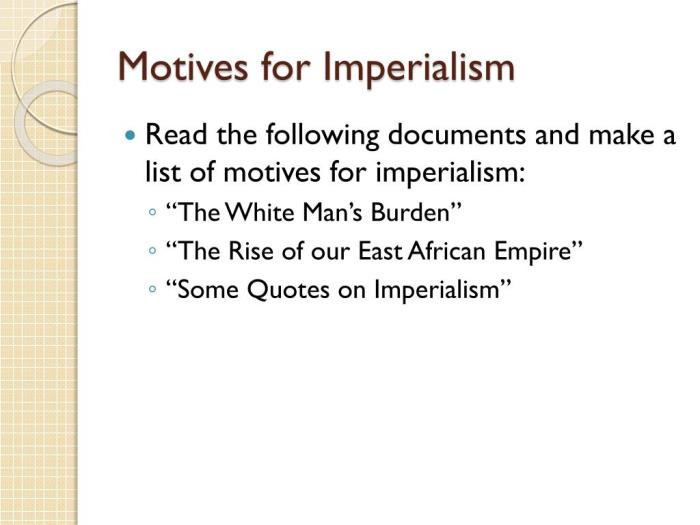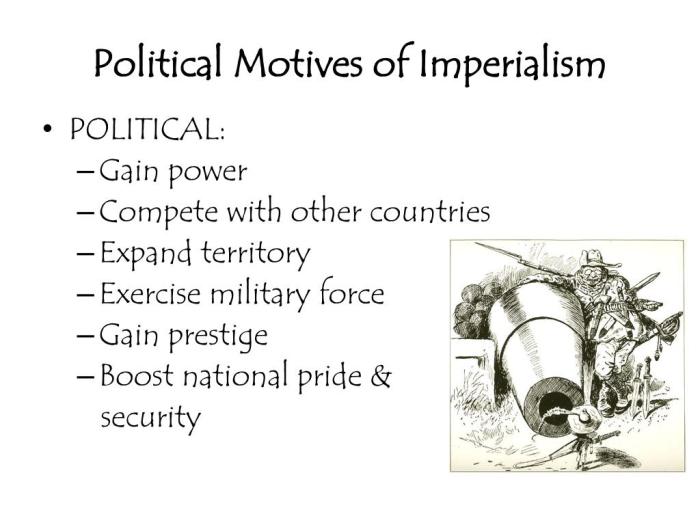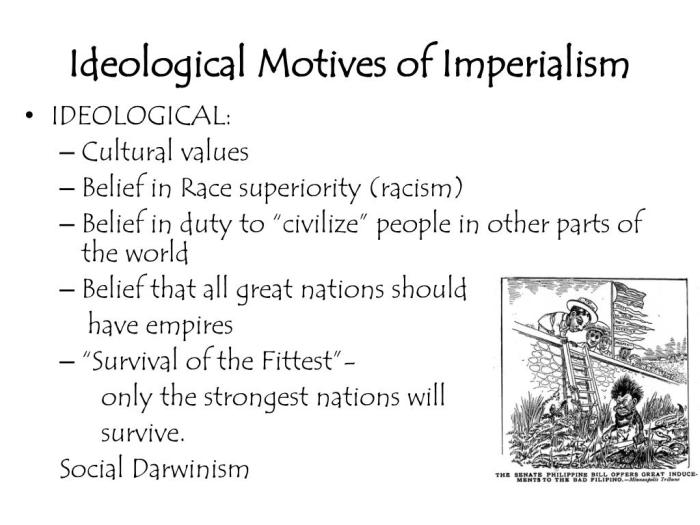Motives for imperialism worksheet answers delve into the intricate reasons that drove European nations to embark on a quest for global dominance. This comprehensive guide unravels the economic, political, and cultural motivations that shaped the course of history, leaving an enduring legacy on both colonizing and colonized nations.
From the pursuit of raw materials to the projection of national power, this guide dissects the complex interplay of factors that fueled imperial expansion. It examines the role of industrialization, nationalism, and cultural superiority in shaping imperial policies and actions.
Motives for Imperialism: Definition and Types: Motives For Imperialism Worksheet Answers

Imperialism refers to the extension of political and economic control by a powerful nation over other territories. It has been a significant force in world history, shaping the geopolitical landscape and influencing the development of numerous societies. Imperial motives are complex and multifaceted, encompassing economic, political, and cultural factors.
Economic motivesinclude the desire to access raw materials, expand markets, and secure trade routes. Political motivesinvolve the pursuit of national prestige, power projection, and strategic security. Cultural motivesencompass the belief in racial superiority and the desire to “civilize” non-Western societies.
These motives are often intertwined and mutually reinforcing. For example, economic ambitions may drive political expansion, while cultural beliefs may justify imperial policies and practices.
Economic Motives for Imperialism

Industrialization and the rise of capitalism created a growing demand for raw materials and new markets. European nations sought to secure access to these resources through imperial expansion. Colonies provided a steady supply of raw materials, such as cotton, rubber, and minerals, which were essential for industrial production.
Imperial powers also established colonial markets for their manufactured goods. This allowed them to expand their economic reach and increase their profits. Some imperial powers imposed tariffs and other trade barriers to protect their colonial markets from foreign competition.
Political Motives for Imperialism
Imperialism was often motivated by a desire for national prestige and power projection. European nations competed for colonies to demonstrate their strength and influence on the world stage. Colonies were seen as symbols of national greatness and a source of pride for the citizens of imperial powers.
Imperialism was also driven by strategic security concerns. European nations sought to control key territories to protect their trade routes and prevent rival powers from gaining a foothold in strategic regions.
Cultural Motives for Imperialism

Cultural factors played a significant role in shaping imperial policies and practices. Europeans often believed in their own racial superiority and saw it as their duty to “civilize” non-Western societies.
Missionaries, explorers, and educators played a key role in promoting imperial expansion. They believed that they were bringing Christianity, Western values, and modern technology to “backward” societies.
Cultural stereotypes and biases often justified imperial policies. Europeans often portrayed non-Western peoples as inferior and in need of European guidance.
Q&A
What were the primary economic motives for imperialism?
The primary economic motives for imperialism included the search for raw materials, new markets for goods, and investment opportunities.
How did political motives contribute to imperial expansion?
Political motives, such as national prestige, power projection, and strategic security, played a significant role in driving imperial expansion. Nations sought to increase their power and influence on the global stage.
What role did cultural factors play in imperialism?
Cultural factors, such as the belief in racial superiority and the desire to “civilize” non-Western societies, contributed to the justification and perpetuation of imperialism.
